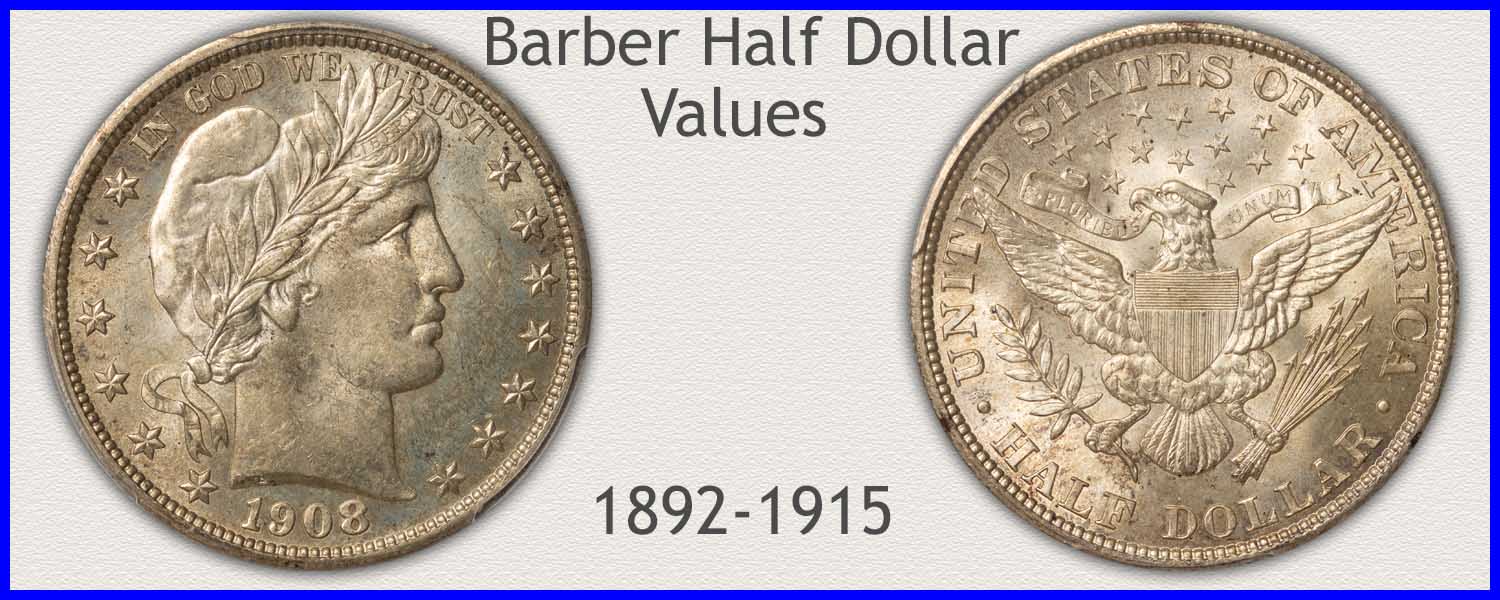Coin Values Moving with Precious Metals: Up-Dated 1/26/2026: Gold $5072 | Silver $107.48
1900 Half Dollar Value
The heavy silver composition of these coins gives all a significant minimum 1900 half dollar value.
Each of these Barber halves was minted with a 90% silver alloy. Currently, silver is trading in the range of $107.48 per ounce on 1/26/2026 . What these are worth today in silver alone is a nice start.
Using the step-by-step process, verify the important features helping spot premium collector quality. Mint issues and the difficulty of locating coins in high condition are important to collectors.
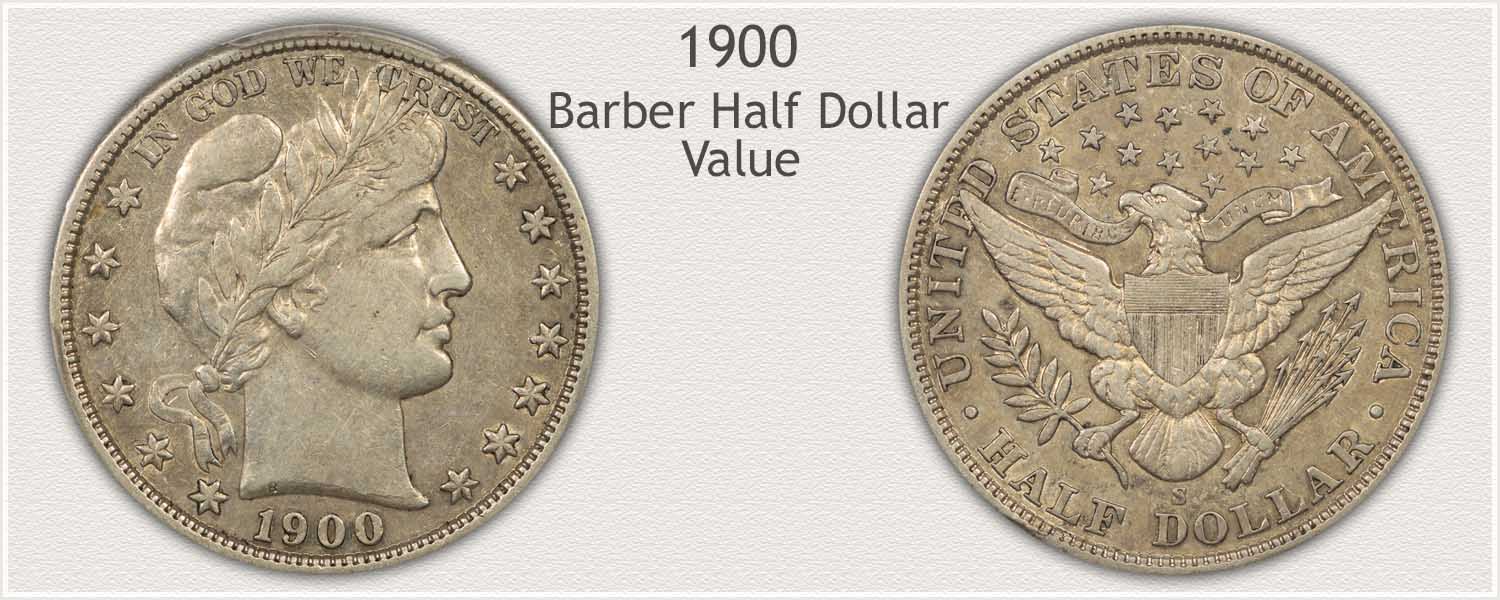
Steps Leading to Value:
- Step 1: Date and Mintmark Variety - The mint that struck these old halves plus the date of the coin is important to an accurate description. There were three separate mints that produced 1900 half dollars.
- Step 2: Grading Condition - Referring to its grade, is how the condition of a coin is described among dealers and collectors. Images in Step 2 represent the different grades.
- Step 3: Special Qualities - All conditions of above-average quality Barber halves are sought by collectors at varying value levels. Preserve aesthetic features of coins with proper handling.
| 1900 Half Dollar Value | ||||
|---|---|---|---|---|
| Condition of Coin | ||||
| Date | Good | Fine | Extremely Fine | Mint State |
| Barber Half Dollar Values Updated | 1/26/2026 | |||
| 1900 | $64.02 | $70 | $209 | $589 |
| 1900 O | $64.02 | $85 | $314 | Rare |
| 1900 S | $60.87 | $72 | $285 | $866 |
Values listed on the chart are Wholesale. Use these values as a starting range. A dealer's needs and precise condition of the half dollar all narrow this range.
Step 1: | Date and Mintmarks Discover Scarce Variety
Abundant to Elusive Mint Issues
Identification of the specific mint that struck these coins helps narrow the values of these vintage half dollars. Among the three mints in production, branch mints have a higher value when determined in a quality condition.
A key indicator is branch mints identified their coinage with a mintmark. The various marks are found by carefully inspecting the reverse.
1900-S Barber Half Dollar
"S" Mintmark on Reverse: San Francisco Mint Struck the Coin
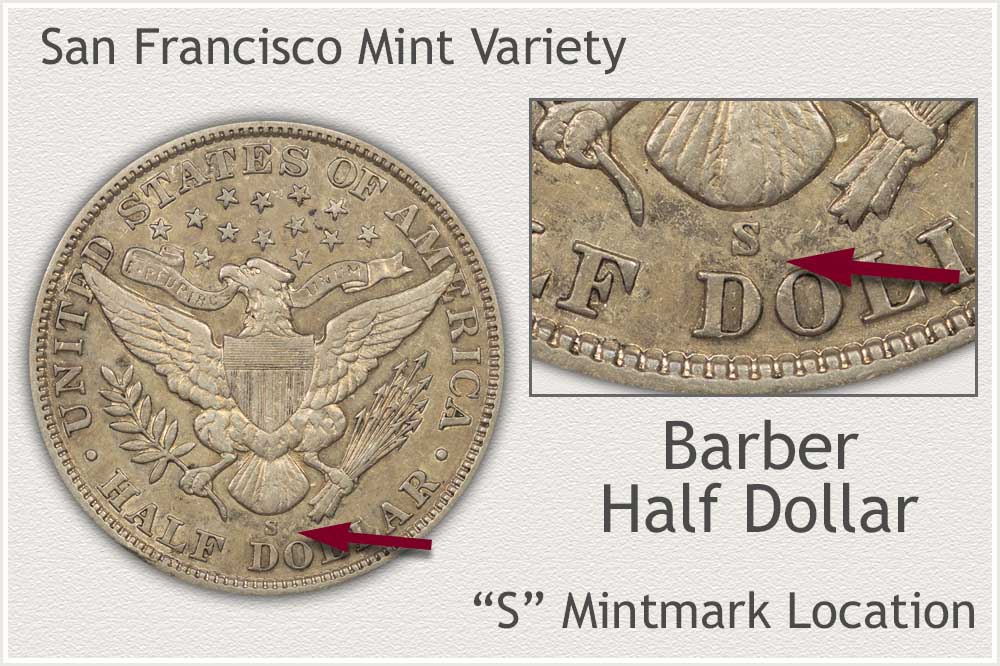
San Francisco half dollars of 1900 hold the status of an available date today; however, most are in well-worn condition. These remained in circulation for an extensive time. With slightly over 2.5 million produced, these are recognized by collectors as an excellent date to represent both a branch mint and the Barber series half dollar. In well-detailed, collector quality condition, all are valued at a strong premium.
To identify the San Francisco half dollar, inspect the reverse of the coin. Just above the "DO" letters of "DOLLAR." The "S" is the mintmark confirming San Francisco struck the coin.
1900-O Barber Half Dollar
"O" Mintmark on Reverse: New Orleans Mint Struck the Coin
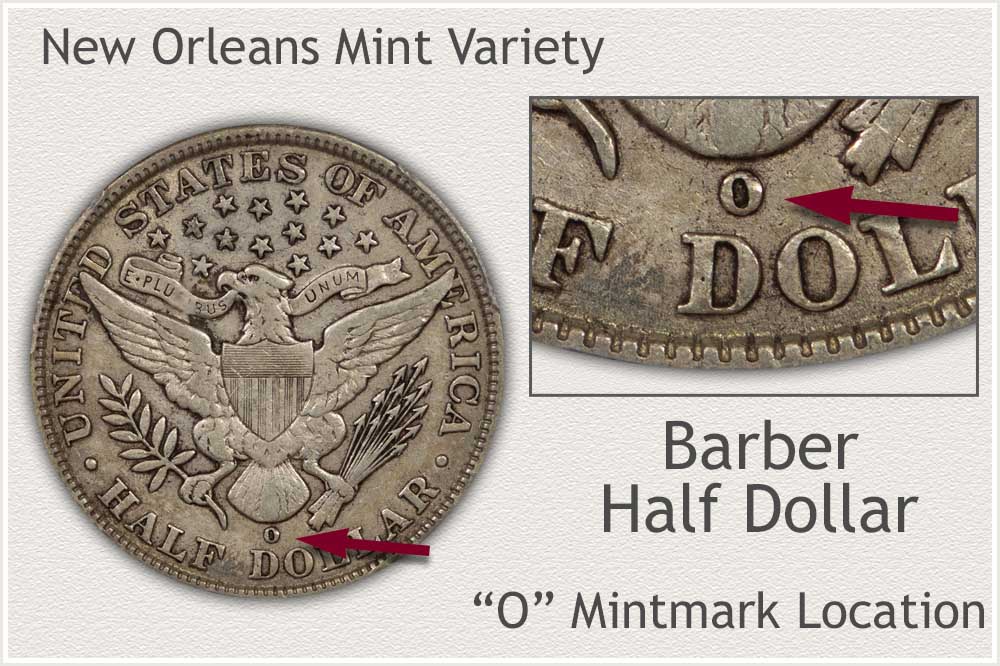
First year of a new century. Popularity of the 1900 New Orleans variety coinage extends to all dates with in the Barber series. These are now an older coin from a mint that retired just after the beginning of the twentieth century. 1900 halves struck at New Orleans saw production numbers reaching 2.7 million and is a typical date found in heavily worn condition today. With its premium value tied to higher, collectible quality, determining its grade is necessary by completing Step 2 below.
An "O" mintmark on the reverse identifies the New Orleans mint production. Look below the Eagle's tail feathers, the large "O" is the New Orleans mintmark.
1900 Barber Half Dollar
No Mintmark on Reverse: Philadelphia Mint Struck the Coin
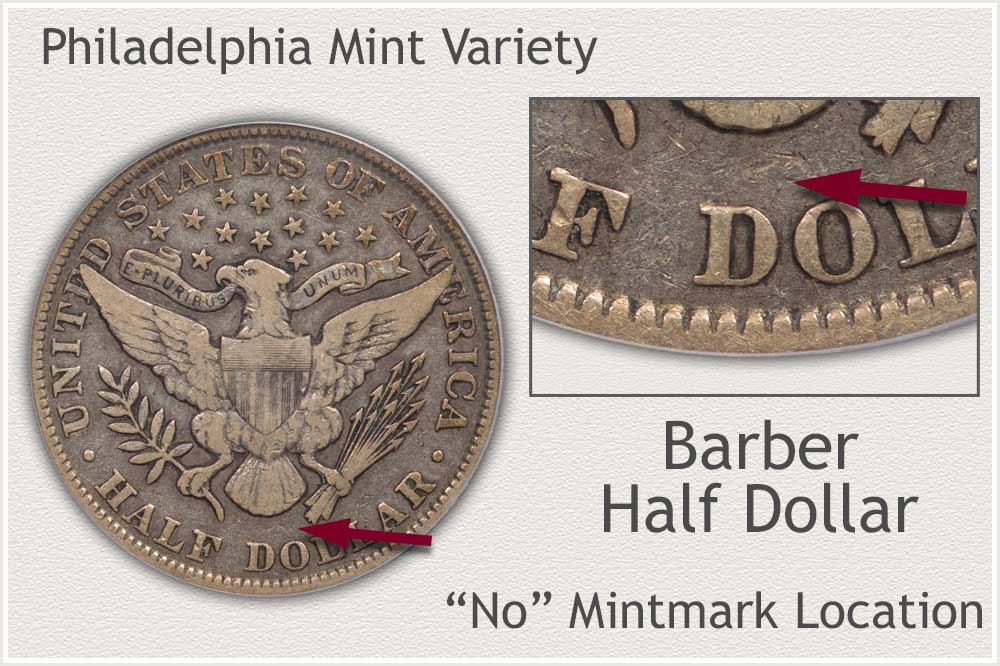
At the beginning of a new century, the Philadelphia mint produced an above average number of half dollars. All are valued starting with their base silver premium. A large market is active seeking these silver coins. Additional demand are collectors placing higher value on quality examples in high condition. The total mintage of slightly more than 4.4 million half dollars in 1900 is recorded as second highest of the series for Philadelphia. Available in heavily worn condition, however infrequent in Fine grade and above.
There is no mintmark on the reverse of Philadelphia issues. An empty space just above the "DO" in "DOLLAR" is a half dollar produced at the Philadelphia mint.
Step 2: | Grading Judges Condition Compared to Standards
1900 Half Dollar Value is Dependent on Condition
Grading a coin involves inspection of the surface and comparing to images representing different stages of wear. These recognizable qualities are defined into grades, helping describe the condition of a Barber half dollar.
Specific areas to judge are highlighted in images and descriptions of grades. A close match narrows the value range on the chart.
Mint State Grade
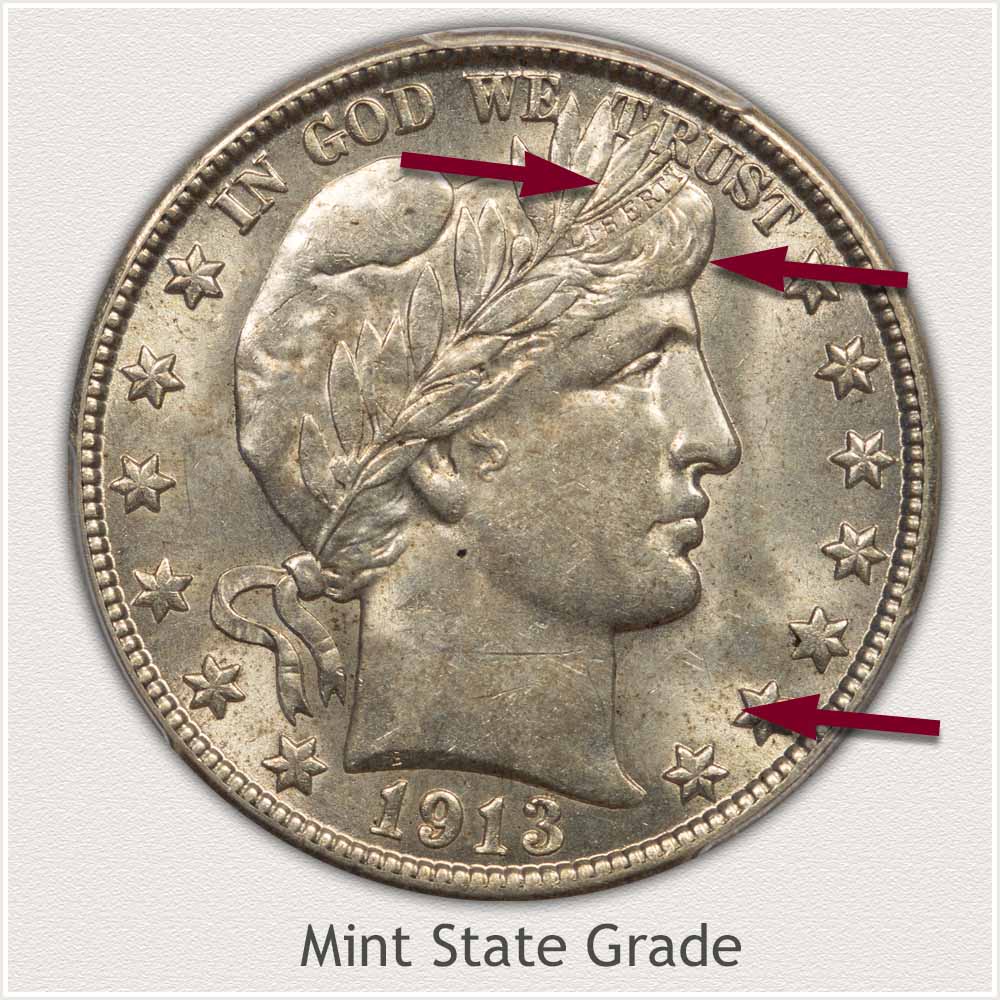
Mint State: Examples in Mint State condition are a prized addition to any collection of Barber half dollars. These coins over time were carefully preserved, so the delicate surface luster has not been worn in any way. A significant factor and definition in determining the Mint State grade is the absence of wear.
When minted, a coin is struck by applying a great deal of pressure from both the upper and lower dies producing a surface covered in luster. This luster is a delicate texture of the metal that is easily damaged, dulled, and smoothed when circulated in commerce. When looking closely at the surface of the coin, the design's highest points, such as Liberty's hair and the ribbon above her brow, are first to show signs of wear and usage quickly.
Examine Liberty's fine hair strands on her forehead using a single source of light. This feature retains its luster in Mint State condition, with no dulling or smoothing. Additionally, the headband with the lettering "LIBERTY" helps confirm the coin's high quality as it displays no wear to its surface. Both areas exhibit no surface wear, highlighting the coin's special quality.
As the coin tilted and moved under light, luster and shine flows across the surface. Any traces of wear show as a duller color to the silver without a bright reflection of light.
Extremely Fine Grade
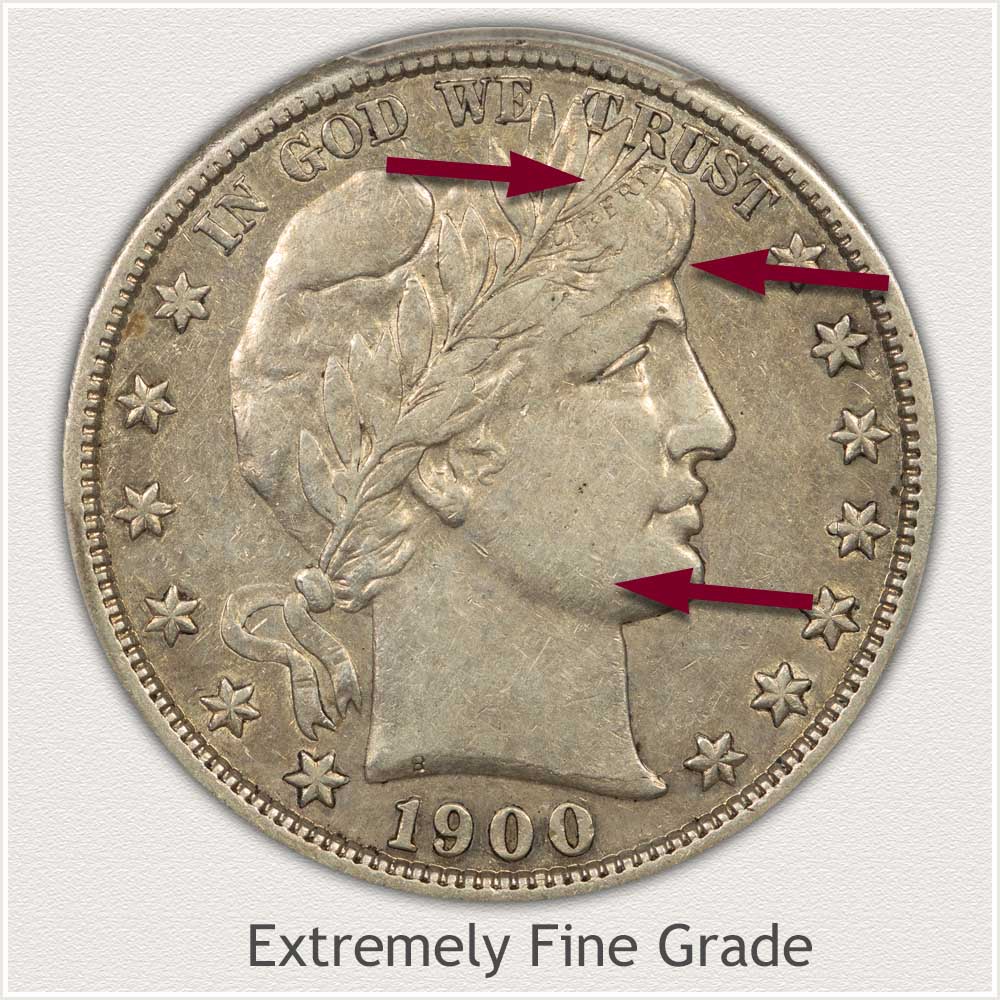
Extremely Fine: Barber halves in Extremely Fine condition are in demand from collectors. However, a few key factors are required to qualify for this high level of preservation. The coin's grade is defined and determined by how much of the minor detail it displays, with the highest relief details only lightly smoothed by wear.
The headband holding Liberty's hair displays a complete and full lettering of "LIBERTY," this is a crucial factor for collectors. Lettering on the ribbon quickly becomes smooth as it wears in this very high-contour area. An Extremely Fine grade example with excellent detail displays the ribbon's top and bottom edges as well as all lettering. Theses coins have a more defined appearance as a result of these sharp details.
Liberty's portrait features a low relief area along her jaw and higher contours of her cheek. Her brow, at the highest relief point, is only slightly smoothed and flattened to meet the requirements of the grade. With just a slight flattening under her eye, Liberty's cheek and neck contours remain well-rounded. There is no widespread connecting of flattened areas in order to receive the grade. The design and features on these high-quality coins remain with their original fine details.
Fine Grade
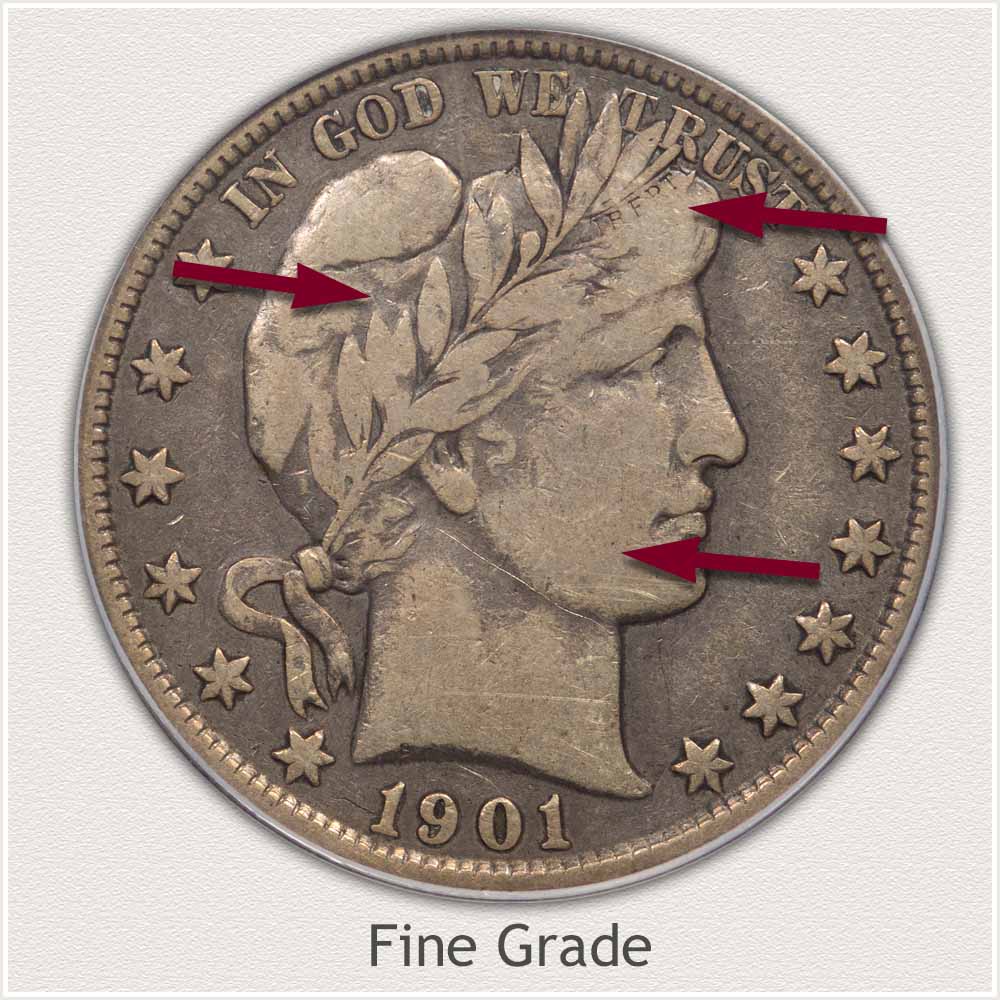
Fine Grade: Circulation wear is now widespread on the example half dollar. Flattening the once rounded contours of Liberty's face is placing this coin in Fine condition. Small details missing and merging of larger features are defining the grade.
An important detail required to meet the Fine grade is visible letters "LIBERTY" found in her headband. The band itself is well worn, lower edge is blended with her hair, and upper edge is very faded. All letters remain, however "ER" is slightly weak toward the bottom. Strongly visible letters are preferred by collectors, indicating a quality, Fine grade coin.
Additionally, leaves are part of a Laurel wreath covering Liberty's hair and holding her cap. Many leaves in the lower row are indistinct. Better represented are full edges visible on the upward pointing leaves. Although mostly flattened, a nicely detailed appearance remains because of the clearly defined leaves. Strong rim, bold date, and stars, plus a lack of distracting marks confirm a collectible Fine grade Barber half dollar.
Good Grade
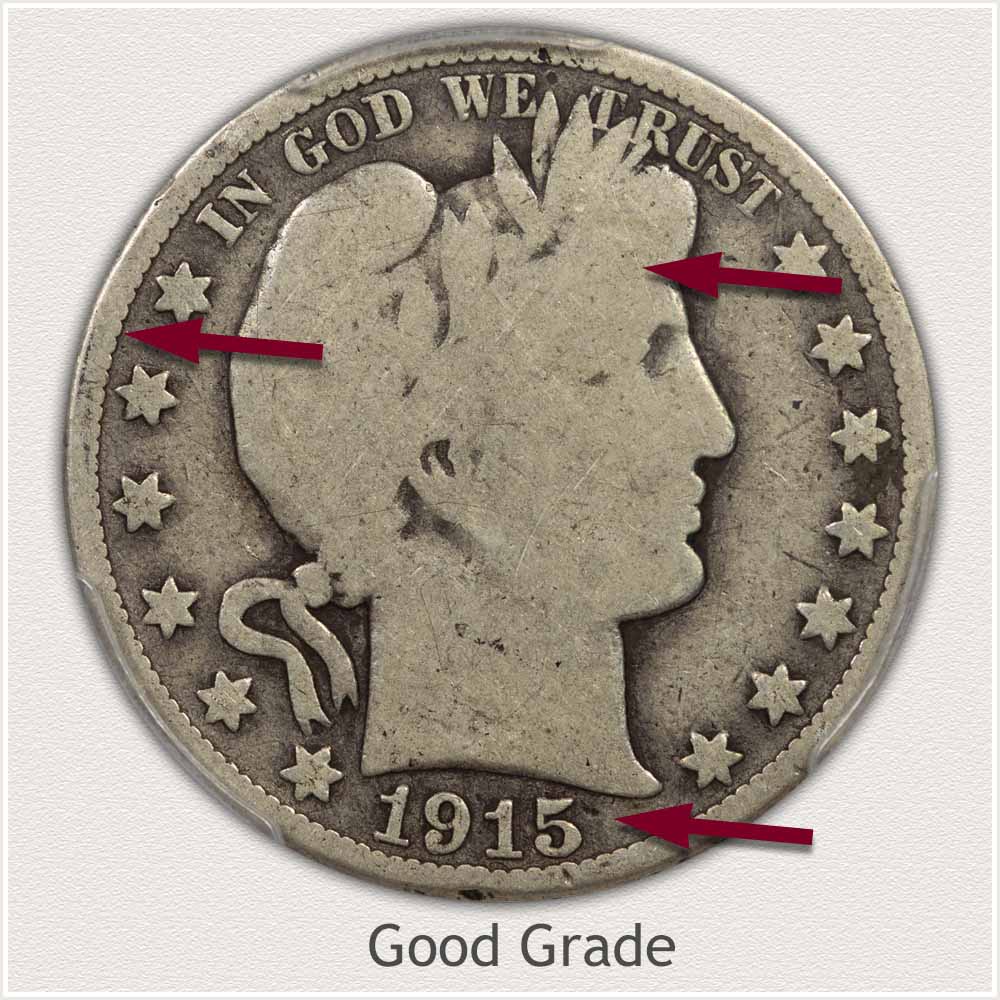
Good Grade: Most high relief areas on a "Good" grade half are worn down to the level of the design's field, are smooth, and lack detail. The grade is determined by the absence of most minor design features.
There is no sign of a hair line along the forehead when examining just above Liberty's eye. As a result of the coin's obvious wear, it is considered a Good grade quality.
Positive characteristics include a rim distinct and separate from the stars and legend at the top of the coin. It is also essential to have a clear and well-defined date. Overall, the impression is of a crisp appearance to the remaining details.
How to Video: Grading Barber Half Dollars
Within each stage of condition a few important areas are key to confirming a grade. Additional descriptions highlighted with images help recognize the true state of preservation.
Video, Images and Descriptions | Grading Barber Half Dollars
Step 3: | Special Qualities Inspection and Handling
Handle Barber Half Dollars Correctly Preserving Quality
Barber half dollars start with a high minimum value based on silver content. Finding an example in a box of old coins has potential of higher collectible worth.
Inspecting and handling old coins is done with care. One of the special qualities of Barber half dollars is their natural ageing developed over time. A few precautions are taken to preserve the coin's surface intact.
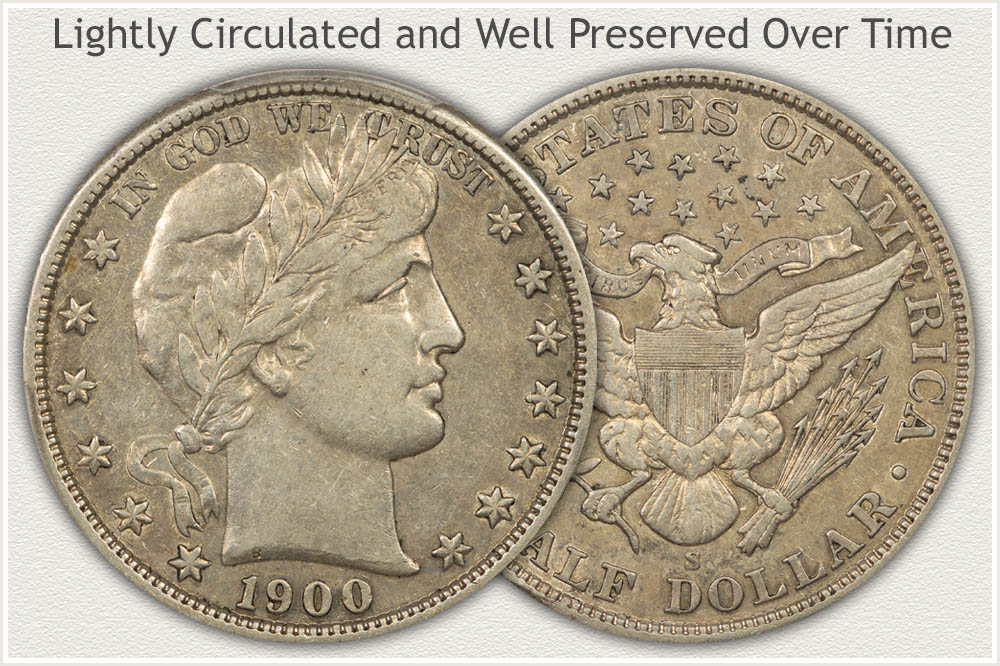 Nice Collector Quality 1900-S Barber Half Dollar
Nice Collector Quality 1900-S Barber Half Dollar
Begin any viewing of coins by washing and completely drying your hands. Unprotected coins are susceptible to showing evidence of finger marks over time.
Along with clean hands is the habit of holding coins by the edges, eliminate touching the surface areas. Clean hands to the edges only are two quick methods to help ensure maintaining stable conditions around older coins.
Work over a flat table with a light source nearby. A single light brings out smaller details, and an open safe area under the coin keeps it from dropping to the floor. Holding the coin slightly away from your face avoids direct breathing of humid air onto the coin.
As you handle coins, be careful of touching your face or foods and beverages. A clean area is maintained.
Smaller details are often recognized with a magnifying glass, helpful when judging condition. 5x power is a good choice. Cell phone images are an alternative, allowing for zooming and doing a good job of seeing small areas of the coin.
Special qualities of Barber half dollars are often delicate by nature. Old toning and the undisturbed "look" are recognized as qualities worth a premium.
References
U.S. Mint. 1901 U.S. Mint Annual Report.
https://nnp.wustl.edu/library/book/514120
U.S. Mint. Catalogue of Coins of the United States.
https://nnp.wustl.edu/library/book/554591
Coin Values | CoinStudy Articles
Date by Date
In Depth Barber Half Dollar Values
1892 to 1915
Barber Half Dollar Value | Scarce Date and Mint Varieties
1900 Barber half dollar is part of a long running design series. The many date and mint varieties are covered in detail and listed on the value chart. Confirm date and mint combination, judge condition to narrow how much these old half dollars are worth.
Use the images to identify your coin from the many U.S. coin series. Each series within the denomination is identified with links to coverage of the steps needed to value these old coins.
Silver Coin Values | Minimum Values of U.S. Silver Coins
Barber half dollars were minted during the "silver" age of U.S. coinage. Each Barber half is 90% silver. All have a strong base in the current worth of silver. Review the images and descriptions of other silver era coinage. Using the calculator find today's current value of silver coins.
Sell Silver Coins | Premium Vintage Silver Issues
Silver U.S. coins are part of a very active market. Dimes, quarters, half, and silver dollars are imaged and described to recognize both the silver issues and the higher value collectible coins. Calculate the current worth and reference listings of dealers to help in selling silver coins.
★Coin Values Discovery finds 1900 Barber Half Dollar Value and...
All U.S. coin values. A starting point to correctly identify your old coin. Recognize the important features to value with a step-by-step process. Continue with a full evaluation of specific dates, mints, and condition.
